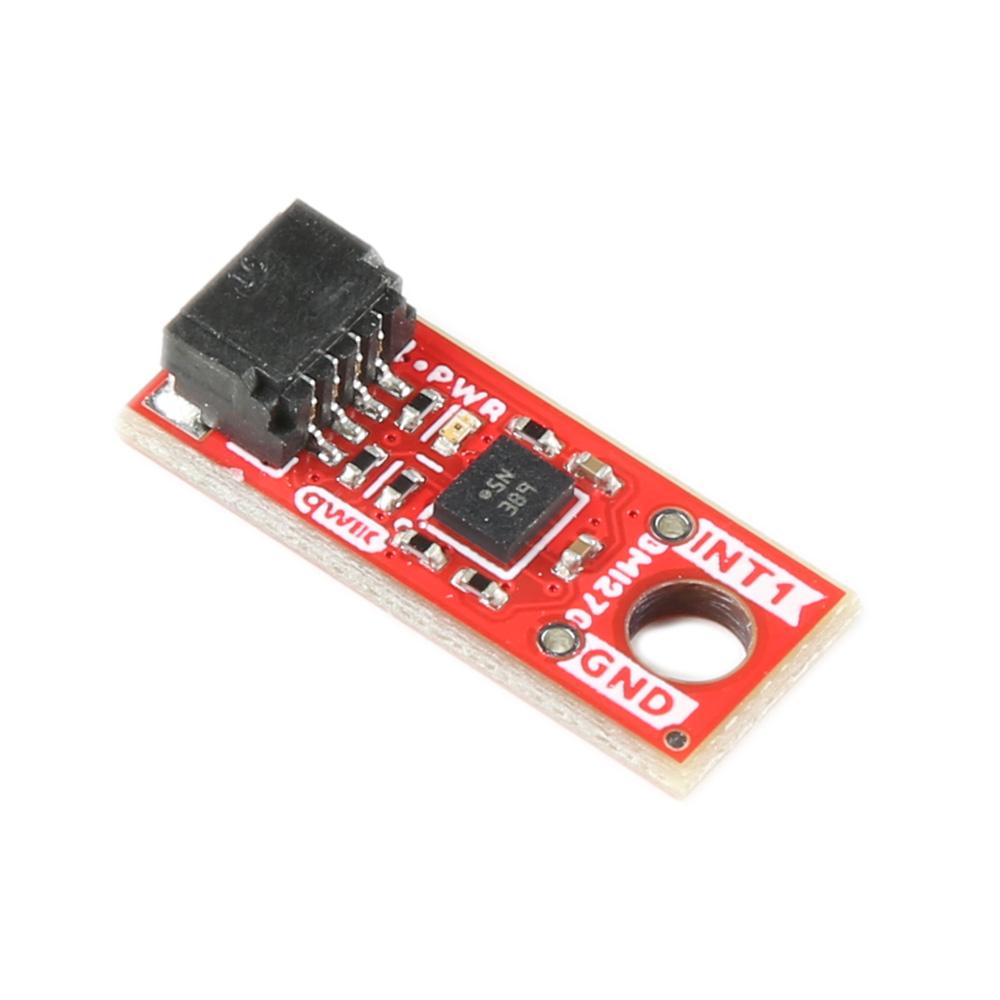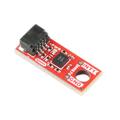SparkFun Micro 6DoF IMU Breakout - BMI270 (Qwiic)

Description Attachments
The SparkFun BMI270 Micro 6DoF IMU Breakout is an ultra-low power, Qwiic-enabled board, designed with a highly-integrated IMU that's perfect for wearables. It provides precise acceleration and angular rate measurement, coupled with intelligent on-chip motion-triggered interrupt features. The BMI270 chip is not just a fast and sensitive accelerometer and gyro pair, but also contains several smart, on-chip motion-triggered interrupt features.The breakout board has a micro-sized footprint of 7.62mm x 19.05mm, making it an excellent choice for your tiniest projects. It can be easily connected with solderless Qwiic cables and compatible controllers. The board also includes solder jumpers, which allow you to select the device address, remove the I²C pull-ups, and disable the power LED if required.The 6-axis sensor of this board combines a 16-bit tri-axial gyroscope and a 16-bit tri-axial accelerometer, featuring Bosch’s automotive-proven gyroscope technology. The BMI270 also includes a variety of features such as an integrated step counter/detector and gesture detection for wrist-worn devices. This makes it suitable for various wearable devices like smart clothes, smart shoes, smart glasses, and ankle bands.The SparkFun Qwiic Connect System is an ecosystem of I²C sensors, actuators, shields, and cables that make prototyping faster and less prone to error. All Qwiic-enabled boards use a common 1mm pitch, 4-pin JST connector, which reduces the required PCB space. The polarized connections ensure you can’t connect it incorrectly.Features of the SparkFun BMI270 Micro 6DoF IMU Breakout include a 16-bit 3-axis accelerometer with various ranges, a 16-bit 3-axis gyroscope, a 400kHz AUX sensor interface with hardware synchronization, I²C Addresses: 0x68 (default), 0x69, 1.8V and 3.3V operation, ultra-low current consumption, and several smart features like significant motion detection, activity change recognition, and wrist gesture recognition. Please refer to the provided documents for more information, including the schematic, Eagle Files, board outline, hookup guide, datasheet, Qwiic info page, Arduino library, and GitHub hardware repo.
Properties
Brand information
| Brand | Sparkfun |
| Model | SEN-22398 |
| More info | Introduction - SparkFun 6DoF IMU Breakout - BMI270 (Qwiic) Hookup Guide |
Size info
| Length | 9 mm |
| Width | 20 mm |
| Height | 5 mm |
| Weight | 2,5 g |
€ 21,75€ 18,00 Excl. VAT (NL)
+ + =
Frequently bought together Total price:
Alternative products
- Opencircuit 6-DOF (gyroscope and accelerometer) module (GY-521) € 2,70 View product
- In stock Opencircuit ADXL345 3-axis Accelerometer (GY-291) € 2,70 View product
- SparkFun Triple Axis Magnetometer Breakout - MLX90393 (Qwiic) € 24,75 View product
- In stock SparkFun Absolute Digital Barometer - LPS28DFW (Qwiic) € 24,75 View product
- DFRobot Gravity: BNO055+BMP280 intelligent 10DOF AHRS € 32,- View product
- In stock SparkFun 6DoF IMU Breakout - BMI270 (Qwiic) € 23,- View product
- Adafruit L3GD20H Triple-Axis Gyro Breakout Board - L3GD20/L3G4200 Upgrade € 15,50 View product
- Pimoroni MSA301 3DoF Motion Sensor Breakout - PIM456 € 7,- View product
- In stock SparkFun Triple Axis Accelerometer Breakout - KX134 (Qwiic) € 44,50 View product
- Adafruit 9-DOF Absolute Orientation IMU Fusion Breakout - BNO055 € 43,25 View product
- DFRobot Fermion: 10 DOF IMU Sensor - ADXL345+ITG3205+VCM5883L+BMP280 (Breakout) € 16,- View product
- Sparkfun LilyPad Accelerometer - ADXL335 € 23,- View product
- Adafruit LSM6DS3TR-C + LIS3MDL - Precision 9 DoF IMU € 24,75 View product
- Adafruit 9-DOF Absolute Orientation IMU Fusion Breakout - BNO055 € 37,- View product
- Opencircuit 9-DOF (gyroscope, accelerometer, magnetometer) module € 11,20 View product
- DFRobot Fermion: BNO055 Intelligent 9-axis Sensor (Breakout) € 22,25 View product
- Adafruit ADXL335 - 5V ready triple-axis accelerometer (+-3g analog out) € 18,50 View product
- DFRobot Compact Triple Axis Accelerometer with Bosch BMA220 Sensor € 6,25 View product
- Adafruit LIS3DH Triple-Axis Accelerometer (+-2g/4g/8g/16g) € 6,25 View product
- In stock SparkFun 6 Degrees of Freedom Breakout - LSM6DSO (Qwiic) € 21,- View product
- Adafruit 9-DOF Accel/Mag/Gyro+Temp Breakout Board - LSM9DS1 € 27,75 View product
- SparkFun Micro 6DoF IMU Breakout - LSM6DSV16X (Qwiic) € 31,50 View product
- In stock Pololu LIS3MDL 3-Axis Magnetometer Carrier with Voltage Regulator € 16,50 View product
- In stock SparkFun Triple Axis Accelerometer Breakout - LIS3DH € 9,75 View product
- Pololu LSM6DS33 3D Accelerometer and Gyro Carrier with Voltage Regulator € 20,95 View product
- DFRobot Fermion: BMM350 Triple-Axis Magnetometer Sensor for AR / VR (Breakout) € 8,50 View product
- Pololu L3GD20H 3-Axis Gyro Carrier with Voltage Regulator € 20,95 View product
- DFRobot MPU-6000/MPU-6050: Advanced 6-Axis MotionTracking Devices € 16,- View product
- Adafruit LSM6DSO32 6-DoF Accelerometer and Gyroscope € 15,50 View product
- SparkFun 9DoF IMU Breakout - ISM330DHCX, MMC5983MA (Qwiic) € 56,50 View product
- Pololu MinIMU-9 v5 Gyro, Accelerometer, and Compass (LSM6DS33 and LIS3MDL Carrier) € 38,60 View product
Customer questions
Q
Customer Reviews
SparkFun Micro 6DoF IMU Breakout - BMI270 (Qwiic) ★★★★★Click a star to leave your review
Suggested products
- In stock Opencircuit 5V Relay module 2 channels € 1,50 View product
- In stock Opencircuit NodeMcu v3 Lua ESP-12E WIFI Development Board € 4,80 View product
- Opencircuit Tansparant frame for the W1209 temperature-controlled relay € 0,80 View product
- In stock Adafruit Hook-up Wire Spool Set - 22AWG Stranded-Core - 6 x 25ft € 24,75 View product
- Adafruit ADXL335 - 5V ready triple-axis accelerometer (+-3g analog out) € 18,50 View product
- PLA Filament Black - 1.75 - 1kg - Devil Design € 17,20 View product
- Opencircuit Gift card View product
- In stock Velleman Adjustable soldering station - 50 w - 175-480 °c € 21,30 View product
- In stock Cytron Maker Mini Sumo Controller: Simplifying Sumo Robot for Beginner € 38,55 View product
- In stock Velleman Spare soldering tip pointed 1mm - for VTSSC50N € 2,40 View product
- In stock Sparkfun Flexible Qwiic Cable - 200mm € 3,10 View product
- Pololu Digital Distance Sensor 15cm € 19,85 View product
- In stock DFRobot FireBeetle ESP8266 IoT Microcontroller (Supports Wi-Fi) € 9,25 View product
- In stock Sparkfun LED - Ultraviolet € 2,- View product
- Itead SONOFF Zigbee Motion Sensor | SNZB-03P € 14,55 View product
- Deal In stock -10 % Sparkfun Alligator Test Leads - Multicolored (10 Pack) € 6,50 € 5,85 View product
- In stock Sparkfun Teensy Stackable Header Kit (Extended) € 2,25 View product
- In stock Sparkfun RJ45 8-Pin Connector € 2,50 View product
- In stock Sparkfun Voltage Regulator - 3.3V € 3,- View product
- In stock Sparkfun Qwiic JST Connector - SMD 4-Pin (Vertical) € 1,- View product
- In stock Sparkfun Capacitor Ceramic 0.1uF € 0,55 View product
- In stock Sparkfun Mini Power Switch - SPDT € 2,25 View product
- Deal In stock -18 % Sparkfun Voltage Regulator - Adjustable LM1117 SMD € 2,- € 1,65 View product
- In stock Sparkfun Copper Tape - Conductive Adhesive, 5mm - 15 meter € 7,75 View product
- In stock Sparkfun Rotary Encoder - Illuminated (RGB) € 6,25 View product
- In stock Sparkfun Clear Plastic Knob € 1,50 View product
- In stock Sparkfun Silicone Electrical Tape - Pack of 10 Strips € 7,35 View product
- In stock SparkFun Micro 6DoF IMU Breakout - BMI270 (Qwiic) € 21,75 View product
- In stock Sparkfun Resistor Lead Bending Tool € 11,25 View product
- In stock Sparkfun Hobby Motor - Gear € 3,50 View product










